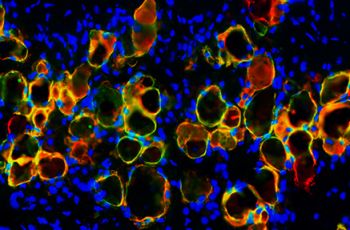At first glance, Public Health student Maureen Collins and Medicine student Frederik Rebling couldn’t be more different.
Collins’ marketing textbooks hold little appeal for Rebling, whose passion lies in molecular biology. Collins, a native Washingtonian, is foreign to Rebling’s home country, Germany. And, while Collins spent her spring break in Haiti, Rebling’s summer vacation found him in an on-campus lab.
These differences, however, are merely peripheral to the students’ core similarities: a compassionate heart, an intellectual curiosity, and a home they call GW.
Maureen Collins, M.P.H. Candidate 2010, Public Health Communications and Marketing
With graduation approaching, Collins reflects on her GW experiences. “You don’t always get to be in a situation where everybody is working for a common goal and that goal being something good,” she says. “I couldn’t think of a better placeto be.”
Collins’ medical mission to Haiti last spring epitomized her graduate career. Through the Medical Center’s International Medicine Program, Collins and 13 fellow students collaborated with Project Medishare to set up mobile health clinics and provide care to thousands.
While there, she was struck by the prevalence of children suffering from ringworm, which can be contracted through bare feet. Upon her return, Collins organized a shoe drive, planning to send the collection to Haiti with this year’s mission. But when the earthquake struck, the need for shoes was eclipsed by even more basic needs.
“When I heard about the earthquake, I was overcome with emotion,” she recalls. “My first thoughts went to the kind, appreciative Haitians I had met.” Collins shared her devastation with her mission team members, who collaborated to raise thousands of dollars for relief. “There is so much need but only so much you can do,” Collins says. “It’s just a matter of everybody doing whatever they can.”
Frederik Rebling, M.D. Candidate 2013, Research Track
Neither the summer heat nor his stiff new shoes kept Rebling from walking to the White House after his GW interview two years ago. Having since grown accustomed to the city, he has yet to see his excitement fade. “Every day I walk through the gates of GW and feel very lucky,” he says.
Particularly, he has found reward in research. Under a Gill Fellowship last summer, Rebling worked with Tim McCaffrey, Ph.D., director of GW’s Catharine Birch McCormick Genomics Center, to identify aspirin-resistant (AR) biomarkers using whole blood genome profiling.
“After a heart attack, doctors may prescribe aspirin to prevent further coagulation,” Rebling explains. “But some people have another heart failure because they are unknowingly resistant to aspirin. We are trying to find a way to identify these patients in a clinical setting.”
Rebling’s research linked AR patients with several enzymes of interest. Though the research continues, Rebling’s findings hold great potential for personalizing cardiovascular disease treatments.
“It takes a long time to figure these kinds of things out, so I am excited that I was able to be part of it,” says Rebling. “I could not have had this experience anywhere else.”


